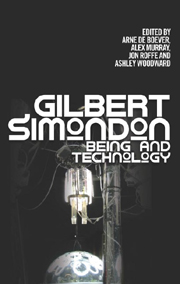Book contents
- Frontmatter
- Contents
- Abbreviations
- Editors' Introduction: Simondon, Finally
- 1 Technical Mentality
- Explications
- Implications
- Resonances
- 9 Gilles Deleuze, a Reader of Gilbert Simondon
- 10 Science and Ontology: From Merleau-Ponty's ‘Reduction’ to Simondon's ‘Transduction’
- 11 The Question of the Individual in Georges Canguilhem and Gilbert Simondon
- 12 The Theatre of Individuation: Phase-Shift and Resolution in Simondon and Heidegger
- Glossary: Fifty Key Terms in the Works of Gilbert Simondon
- Notes on Contributors
- Index
12 - The Theatre of Individuation: Phase-Shift and Resolution in Simondon and Heidegger
from Resonances
Published online by Cambridge University Press: 12 September 2012
- Frontmatter
- Contents
- Abbreviations
- Editors' Introduction: Simondon, Finally
- 1 Technical Mentality
- Explications
- Implications
- Resonances
- 9 Gilles Deleuze, a Reader of Gilbert Simondon
- 10 Science and Ontology: From Merleau-Ponty's ‘Reduction’ to Simondon's ‘Transduction’
- 11 The Question of the Individual in Georges Canguilhem and Gilbert Simondon
- 12 The Theatre of Individuation: Phase-Shift and Resolution in Simondon and Heidegger
- Glossary: Fifty Key Terms in the Works of Gilbert Simondon
- Notes on Contributors
- Index
Summary
We know very well that where Heidegger says that time is the veritable principle of individuation, Simondon responds that there is no principle of individuation, but the process of individuation. Since the reading that I proposed of Being and Time, I have maintained that one of the major concepts that has allowed for the philosophical advances of the twentieth century – as much neglected and misunderstood as it has remained, also in Heidegger – is the concept of primary retention discovered by Husserl in 1905. I will not explain again here the reasons that led me to claim that, even if I share with Husserl the point of view that absolutely distinguishes primary retention, which is the ‘big now’ of perception, to speak like Gérard Granel, from secondary retention, which is, like the second synthesis of the Critique of Pure Reason, the result of reproduction and imagination in memory and thus as past, I no longer agree at all with Husserl when he claims that primary retention owes nothing at all to secondary retention. I have tried to show that primary retention is always a primary selection and that this selection is always brought out in the function of secondary retentions that anticipate the primary retention in the form of secondary protentions (with the primary protentions being carried by the temporal object that supports the phenomenon) and that as such filter it.
- Type
- Chapter
- Information
- Gilbert SimondonBeing and Technology, pp. 185 - 202Publisher: Edinburgh University PressPrint publication year: 2012



